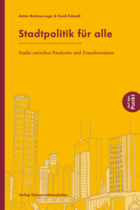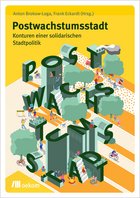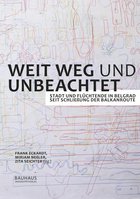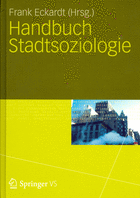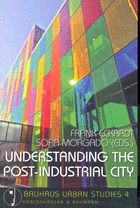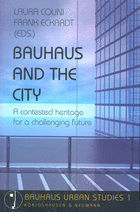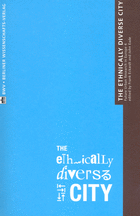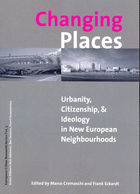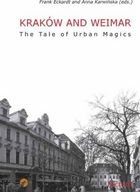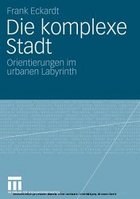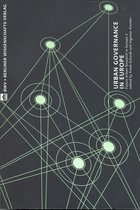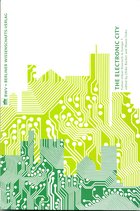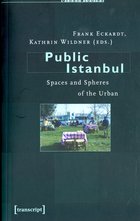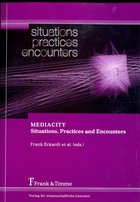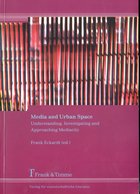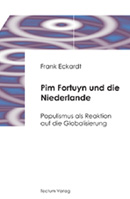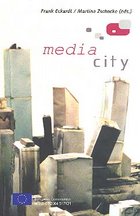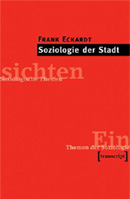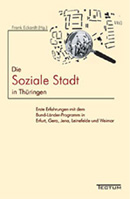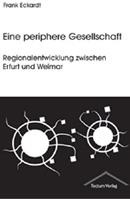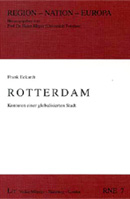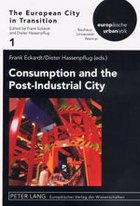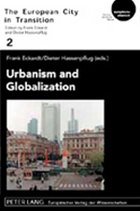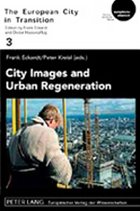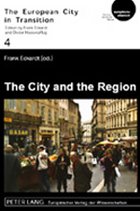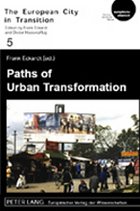Publikationen
Übersicht Publikationen
Die Corona-Krise hat die Erosion städtischer Solidarität offen zu Tage treten lassen. Dagegen bringen Anton Brokow-Loga und Frank Eckardt in dieser Schrift die praktische Utopie einer solidarischen Postwachstumsstadt „auf den Punkt“.
Vom Commoning über die Umverteilung der städtischen Flächen bis zu einer sozial-ökologischen Verkehrswende: Eine progressive Stadtpolitik für alle überwindet bisheriges Schubladendenken. Sie setzt stattdessen auf heterogene Zusammenhänge und ungewöhnliche Bündnisse.
Zu dem hier umrissenen Vorhaben gehört auch, eine basisdemokratisch orientierte Stadtpolitik mit dem Ziel einer umfassenden Transformation von Stadt und Gesellschaft zu verknüpfen. Wie kann ein Blick auf die kommunale Ebene helfen, globalen Ungerechtigkeiten zu begegnen? Welchen Weg weisen munizipalistische Plattformen und Vergemeinschaftungen jenseits von Privat- oder Staatseigentum?
Anton Brokow-Loga, Frank Eckardt
Verlag Graswurzelrevolution, Heidelberg, 2021
ISBN 978-3-939045-45-8
Download Open Access
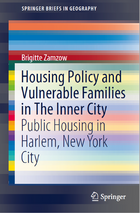
Zamzow, Brigitte (2020): Housing Policy and Vulnerable Families in the Inner City. Public Housing in Harlem, New York City. Springer.
This book provides insights in how the lack of coherent social policy leads to the displacement of vulnerable low-income families in inner-city neighborhoods facing gentrification. First, it makes a case for how social policy by its racist setup has failed vulnerable families in the history of U.S. public housing. Second, it shows that today’s public housing transformation puts the same disadvantaged socio-economic clientele at risk, while the neighborhoods they call their homes are taken over by gentrification. It raises the powerful argument that the continuing privatization of Housing Authorities in the U.S. will likely lead to greater income diversity in formerly neglected neighborhoods, but it will happen at the expense of vulnerable families being displaced and resegregated further outside the city, if no regulatory planning measures for their protection are initiated by the government. By providing a solid empirical portrait of public housing in New York City’s Harlem, this book provides a great resource to students, academics and planners interested in gentrification with specific concern for race and class.
Anton Brokow-Loga, Frank Eckardt (Hg.)
oekom verlag, München, 2020
ISBN 978-3-96238-199-8
Städte ohne Wachstum - eine bislang kaum vorstellbare Vision. Doch Klimawandel, Ressourcenverschwendung, wachsende soziale Ungleichheiten und viele andere Zukunftsgefahren stellen das bisherige Allheilmittel Wachstum grundsätzlich infrage. Wie wollen wir heute und morgen zusammenleben? Wie gestalten wir ein gutes Leben für alle in der Stadt? Während in einzelnen Nischen diese Fragen bereits ansatzweise beantwortet werden, fehlt es noch immer an umfassenden Entwürfen und Transformationsansätzen, die eine fundamental andere, solidarische Stadt konturieren. Diesen Versuch wagt das Projekt Postwachstumsstadt.
In diesem Buch werden konzeptionelle und pragmatische Aspekte aus verschiedenen Bereichen der Stadtpolitik zusammengebracht, die neue Pfade aufzeigen und verknüpfen. Die Beiträge diskutieren städtische Wachstumskrisen, transformative Planung und Konflikte um Gestaltungsmacht. Nicht zuletzt wird dabei auch die Frage nach der Rolle von Stadtutopien neu gestellt. Dadurch soll eine längst fällige Debatte darüber angestoßen werden, wie sich notwendige städtische Wenden durch eine sozialökologische Neuorientierung vor Ort verwirklichen lassen. Das Buch ist am 5. März 2020 im oekom verlag veröffentlicht worden und kann hier oder im Buchhandel bestellt werden. Alle Kapitel sind überdies ab sofort durch eine Open Access-Förderung frei zugänglich und können auf der Webseite Postwachstumsstadt.de heruntergeladen werden.
Frank Eckardt, Miriam Neßler, Zita Seichter (Hg.)
Bauhaus Universitätsverlag, 2019
ISBN: 978-3-95773-274-3
Welche Auswirkungen hat es, dass Städte wie Belgrad, die auf der Balkanroute lagen, von einer Transitstadt zu einer Endstation wurden? Sind die Grenzschließungen in der serbischen Hauptstadt sicht- und erfahrbar und wenn ja, wodurch? Wie sieht der Alltag der flüchtenden Menschen aus, die sich auf dem Weg in die EU in Belgrad aufhalten? » mehr

Eckardt, Frank
Springer VS, Wiesbaden, 2018
Dieses essential stellt in komprimierter Form den Stand der Stadtforschung zum Thema Gentrifizierung dar. » mehr
"Eckardt gelingt es, nicht nur das Phänomen der Gentrifizierung kompakt darzustellen, sondern auch die Forschungsgeschichte in gleicher Weise zu beleuchten. Dies macht das Buch auch als Einstieg für WissenschaftlerInnen interessant.Es wird zurecht darauf hingewiesen, dass der Gentrifizierung nicht allein durch baurechtliche Maßnahmen Einhalt geboten werden kann und so ist es begrüßenswert, dass neben weiteren Maßnahmen zur Stadtentwicklung bspw. auf die Unterstützung von Genossenschaften hingewiesen wird.Das Essential bietet das, was es verspricht: Einen sehr komprimierten Überblick zum Stand der Stadtforschung hinsichtlich des Themas Gentrifizierung. Als Hinführung zur Auseinandersetzung mit diesem Phänomen ist das vorliegende Werk geeignet."
Patrick Quack, https://www.socialnet.de/rezensionen/25458.php

Hrsg. Frank Eckardt
transcript-Verlag, Februar 2018
250 Seiten
ISBN 978-3-8376-4203-2
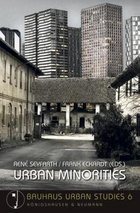
Hrsg. Frank Eckardt, René Seyfarth
Bauhaus Urban Studies 6
Verlag Königshausen & Neumann, 2016
256 Seiten
ISBN: 978-3-8260-5620-8
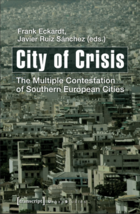
Hrsg. Frank Eckardt, Javier Ruiz Sánchez
transcript-Verlag Urban Studies, 2015
260 Seiten
ISBN 978-3-8376-2842-5
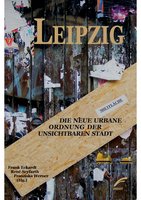
Hrsg. Frank Eckardt, René Seyfarth, Franziska Werner
UNRAST-Verlag, Münster
1. Auflage, März 2015
ISBN 978-3-89771-577-6
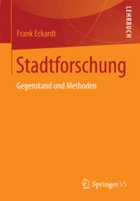
Hrsg. Frank Eckardt
Springer VS
Erscheinungstermin: August 31, 2014
ISBN 978-3-658-00823-9
"Fazit: Das Lehrbuch ist gut konzipiert und sehr verständlich geschrieben. Es vermittelt einerseits Übersichtswissen darüber, auf welche Weise unterschiedliche Herangehensweisen aus den Sozialwissenschaften genutzt werden können, um konkrete Probleme in Städten in einer systematischen und realistischen Weise zu untersuchen. Andererseits will das Buch zu grundlegenden Fragestellungen der Stadtforschung Positionen vermitteln, die zu einem besseren interdisziplinären Verständnis führen sollen." Uwe Helmert, socialnet
Nachzulesen unter: https://www.socialnet.de/rezensionen/18774.php
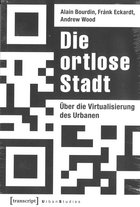
Hrsg. Alain Bourdin, Frank Eckardt, Andrew Wood
200 Seiten
transcript Verlag April 2014
ISBN 978-3-8376-2746-6
"Stadtsoziologen, Geographen, Architekten und Medienwissenschaftler sollten dieses Werk ganz weit oben auf dem Bücherstapel legen." Damian Paderta, Kritische Ausgabe
Nachzulesen unter: http://www.kritische-ausgabe.de/artikel/fluide-und-mehrfach-beschrieben-die-ortlose-stadt
Aufsätze in Büchern und Zeitschriften
2019
B. Zamzow: Is Affordable Housing the new Social Housing? A Case Study of New York City's Public Housing in Harlem. In: Soziologie. Forum der Deutschen Gesellschaft für Soziologie, 1/2019, S. 72-80.
F. Eckardt (2019) Integration im Abseits? Die Ergebnisse des Willkommensmonitor 2017. In: Migration und soziale Arbeit, 41/2, S. 142-148.
F. Eckardt (2019) Heimat ohne Tamtam. In: Edoardo Costadura / Klaus Ries / Christiane Wiesenfeldt (Hg.) Heimat global. Modelle, Praxen und Medien der Heimatkonstruktion. Bielefeld: transcript, S. 197-218.
F. Eckardt (2019): Ungeliebte Nachbarn: warum Geflüchtete als Nachbarn abgelehnt werden. In: Institut für Demokratie und Zivilgesellschaft (Hg.): Wissen Schafft Demokratie, 05/2019, S. 90-97.
F. Eckardt (2019) Grenzen, Städte und Europa. In: F. Eckardt, M. Neßler und Z. Seichter (Hg.) Weit weg und unbeachtet. Stadt und Flüchtende in Belgrad seit Schließung der Balkangrenze. Weimar: Bauhaus-Universitätsverlag, S. 160-179.
2018
F. Eckardt: Wohngemeinschaften: Eine Lösung für das Altwerden. In: Wegbegleiter, S. 12.
F. Eckardt: Ist die Smart City eine soziale Stadt? In: Planerin, 2/18, S.11-13.
F. Eckardt: Rurbanität als Sozialraum. Jugendliche in der Thüringer Peripherie und die Verhandlung eines urbanen Lebensstils. In: S. Langner (Hg.) Rurbane Landschaften. Bielefeld. Transcript, S.189-202.
2017
F. Eckardt: Einleitung / Erinnerte Moderne und die Stadt der Migranten. In: Welche Denkmale welcher Moderne. Frank Eckardt, Hans-Rudolf Meier, Ingrid Scheurmann, Wolfgang Sonne (Hrsg.), by Jovis Verlag GmbH, 2017
F. Eckardt: Willkommene Flüchtlinge, ungeliebte Nachbarn? In: Nina Berding, Wolf-D. Bukow, Karin Cudak (Hg.) Die kompakte Stadt der Zukunft: Ein Praxishandbuch zu Inklusion und Nachhaltigkeit. Wiesbaden: Springer, S. 141-158.
F. Eckardt: Kassel ohne Athen: Die documenta 14 zerbricht an ihrer Ortlosigkeit. In: sub/urban, 5/3, S. 157-166.
F. Eckardt: Austerity and Urban Crisis: Insights from German Cities. In: Planum, 35, 77-92.
F. Eckardt / F. Werner: Stadterneuerung und Flüchtlingspolitik – Perspektiven. In: U. Altrock et al. (Hg.) Stadterneuerung im vereinten Deutschland. Wiesbaden: Springer, S. 209-224.
F. Eckardt: Architecture and the “Right to the City”: The IBA Hamburg as a case for critical urban studies. In: M. Mendes (eds) Architecture and social science. Springer, S. 121-136.
2016
F. Eckardt: Technologie und Virtualität als strukturierendes Element des Sozialraums. In: F. Kessel / C. Reutlinger (Hg.): Handbuch Sozialraum.
Frank Eckardt; Ivana Sidzimovska: Creativity for Integration: Contested Integration of refugees and the art Project "My house is your house!" in Gera, Germany. In: INCLUSIVE / EXCLUSIVE CITIES, Ognen Marina, Alessandro Armando (Eds.)
F. Eckardt: Impuls: Gesellschaft - Willkommensstädte. In: Mehr Stadt. Deutsche Akademie für Städtebau und Landesplanung (Hrsg.) Almanach 2015/2016, S.56-63
F. Eckardt und N. Brönner: Drawing Attention: Tracing Heritage & Interactions in the Brazilian Quarter of Lagos. In: open City Lagos / 2.0 Cultural Narratives, Urban Aesthetics, S. 66-72. This is a publication by Heinrich Böll Foundation (Nigeria), Nsibidi Institute (Nigeria) & Fabulous Urban (Switzerland). Jan. 2016.
A. Steigemann, F. Eckardt, F. Werner: A welcoming policy in post-socialist East Germany. In: Forced Migration Review, 51,1, 67-69.
Eckardt, F. (2016): The Virtual City: From augmented urbanism to urban hacking. In: Urban Art: Creating the Urban with Art. Proceedings of the International Conference at Humboldt-Universität zu Berlin 15-16 July, 2016. S. 13-17.
2015
F. Eckardt: Reflections on a Bordercity. In: BORDER CITY; Chapter 1 – Documentation of an interdisciplinary project in San Diego (US) and Tijuana (Mexico) by the Bauhaus-Universität Weimar and the University of California, San Diego (Public Art, Environmental Engineering and Urbanism), Weimar 2015
F. Eckardt: Zehn Jahre nach dem Hurrikan; New Orleans und Obama ziehen Bilanz. In: Welt Trends – Das außenpolitische Journal, Nr. 110, Dezember 2015
F. Eckardt: „Metropolregionen“ in Germany: The Enforcement of Global City-Regions. In: MISCELLANEA GEOGRAPHICA – REGIONAL STUDIES ON DEVELOPMENT, Vol . 19 ˑ No. 4 ˑ 2015
F. Eckardt: Flüchtlinge nach Ostdeutschland? In: Blätter für deutsche und internationale Politik, 12, S. 13-16.
F. Eckardt: Die Werkstatt Sozialraumanalyse in Weimar. In: Soziale Passagen, 12, 7(2), 363-367.
2014
F. Eckardt: Many voices but no plan? Planning the city in the field of diverse narratives. In: Planum. The Journal of Urbanism. No. 26, vol 2.
2013
F. Eckardt: Viele Wege nach Rom. Was leistet die Stadtsoziologie heute? In: Soziologische Revue, 36/2, 132-143.
2012
F. Eckardt: Participation at any price? The Ambivalence of the Renaissance of Direct Democracy in German Municipalities. In: Social Space, 1/3, S. 51-72.
2011
F. Eckardt: Cuando la gente se hace oír: Reflexiones sobre el renacimiento de la democracia directa en Alemania. In: urban, 1/2011, S. 67-80.
2010
2009
2008
2007
2006
Frank Eckardt, Gaëlle Monnet (2006): La Maison des multiples générations. Un nouveau programme gouvernemental. In: Les annales de la recherche urbaine, 100. S. 33-37.
2005
2004
2001
European City in Transition Buchreihe
Publikationsprojekte
Handbuch Wohnsoziologie: Prozesse, Räume und Kontexte des Wohnens
Verlag: Springer, Wiesbaden.
Erscheinungsdatum: 1.12.2019
Konzept: Wohnen ist ein grundlegendes menschliches Bedürfnis, das in allen Gesellschaften und zu allen Zeiten wichtig gewesen ist. Wie Individuen ihr Leben gestalten können, hängt zu einem großen Teil davon ab, wo, mit wem und wie sie wohnen. Die Art und Weise des Wohnens zeigt zugleich auf, dass es historisch wie gesellschaftlich unterschiedliche Formen des Wohnens gibt. Wohnen ist somit ein komplexer und sozialer Prozess, der ein wichtiger Bestandteil des Alltags ist, der aber im Zusammenhang mit anderen gesellschaftlichen und stadtplanerischen Fragen wie der sozialen Ordnung und Hierarchien, Machtverhältnissen, Vorstellungen über Rollen und Kultur, sowie über das eigentliche Wissen und das Verständnis von Architektur und Stadtentwicklung zu sehen ist. Die Soziologie des Wohnens benötigt von daher eine Kontextualisierung, die das Entstehen von Wohnorten und sozialräumlichen Routinen und die Wirkung planerischer Entscheidungen und alltäglicher Prozesse des Wohnens einordnet. Damit werden die übergeordneten und abstrakteren gesellschaftlichen Kontexte des Wohnens, die sich über räumliche Strukturen, Institutionen und Prozesse individuell vermitteln. Die Räume des Wohnens ergeben sich aus spezifischen Prozessen der Raumproduktion. Dazu gehört, dass bestimmte Raum- Wohntypologien, Raum-Narrative und Siedlungsstrukturen aus dem Zusammenspiel von Architektur, Städtebau, Stadtplanung, Wirtschaft, Politik und Gesellschaft ergeben. Hierzu gehören Räume der Nachbarschaft, der Großsiedlungen, der Vor- und Zwischenstadt und das Wohnen in stigmatisierten Stadtteilen. Die verschiedenen Wohnformen spiegeln dabei auch die jeweils spezifische Lebenslagen unterschiedlicher sozialer Gruppen. Produkt dieser diversifizierten Wohnformen, kontextueller und räumlicher Wohnungsprozesse sind bauliche Orte, die ihrerseits in ihrer Stereotypisierung die Grenzen und Möglichkeiten des individuellen Wohnens bestimmen. Dazu gehört das Wohnen in Eigenheimen, in gemeinschaftlichen Wohnformen, in Heimen, in prekären Umständen oder in Krankenhäusern.
Ziel der Publikation: Das Handbuch Wohnsoziologie will den aktuellen Wissensstand zum Thema Wohnen übersichtsartig wiedergeben. Dabei soll die Entwicklung des Themas mit Bezug auf den deutschen Wohnungsmarkt, Wohnungsbau und Stadtentwicklung dargestellt werden und wichtige Herausforderungen für das Wohnen der Zukunft identifiziert werden.
Das Handbuch soll eine Lücke schließen, die sich seit der letzten Publikation von Häußermann und Siebel aus dem Jahr 1991 ergeben hat. Obwohl soziologisch ausgerichtet, ist die Publikation interdisziplinär ausgerichtet und wird von Autor/innen aus unterschiedlichen Disziplinen getragen.
Zielgruppen: Studierende der Architektur, Stadt- und Regionalplanung, Sozial- und Kulturwissenschaften, Soziale Arbeit
Die Herausgeber: Dr. Frank Eckardt ist Professor für sozialwissenschaftliche Stadtforschung an der Bauhaus-Universität Weimar. Dr. Sabine Meier ist Juniorprofessorin für Räumliche Entwicklung und Inklusion an der Universität Siegen.
European Cities Planning for Asylum
Special Issue for the Journal "Urban Planning"
Editor: Frank Eckardt (Bauhaus-Universität Weimar, Germany)
Issue Release: November 2018, Volume 3, Issue 4, https://www.cogitatiopress.com/urbanplanning
Information: With the political intention of the EU to develop a common asylum policy, the area of urban planning needs to be understood as a policy field for shaping equal conditions for the hosting and integration of refugees. In this regard, the question on how different planning systems in Europe are working becomes an important subject for further investigation. So far, an overview on the different national asylum systems and their relationship to urban planning does not exist.
This issue works with the intention to create a systematic knowledge on how different national planning systems and cultures are related to the integration of refugees into local contexts. By doing so, it will enable to see communalities and differences and further analysis will enable to link these findings to the different roles of the planning institutions and national legal frameworks. Urban planning thereby does not only fulfil a role within a complex field of relationships to other institutions, it also works with its own concepts, narratives, and interpretations of what is perceived as necessary for integration and planning. In this regard, the issue aims to look at the internal dimension of urban planning processes as well, so that the basic assumptions of local planning procedures regarding integration can be formulated and discussed.
It will furthermore create an in-depth understanding on the effects of different housing strategies for refugees and their impact on the individual integration into relevant domains like the job market, education, social institutions and neighbourhood life, looking at the effects of segregation of refugees due to different understandings of integration and the choice of planning strategies and decisions.
In sum, the overall objective of this issue is to deliver a comprehension on the potential role urban planning can have to support the long-term integration of refugees and to identify possible effects of different chosen strategies. It aims to provide knowledge on the current state of urban planning with regard to refugee integration, including especially housing but also other relevant domains. In the light of the political relevance of a joined EU asylum policy, this issue wants to contribute to set up an academic basis for both further research in the field of urban planning/urban studies as well for the consultancy of future European policies on the subject of refugee integration, basing its theoretical approach from a variety of research and academic discourses. It is linked to the following concepts:
Urban planning system: The understanding of urban planning as being partly understandable as an institution of a multi-layered state. Competences and obligations, relationships to other institutions and to the citizenry are framed by the wider political system and to some extent by the European unification process. In this regard, the concept of “urban governance” as a broadening of the state activities to steer society is followed (see P. Le Galès, 2011).
Refugee studies: Refugees are a particular group of inhabitants which are characterized by specific social aspects, in particular the remaining uncertainty regarding their asylum status, their future position in society, the possibilities of return to their home country. Furthermore, the social abilities of refugees to integrate into society are regarded to be not only depending on their professional, language and social skills but also on their psychological well-being (Black, 2010).
Urban planning culture: While the planning system looks at the embedding of planning, the planning culture needs to be analysed with regard to its internal conceptualisation and self-interpretation (see Othengrafen, 2012). This allows to identify different understandings of planning concepts and discourses. This is important as planning for integration remains a weak legal concept and therefore requires a massive work of interpretation by the planners themselves.
Local integration policies: Research on this field works with the assumption that cities are the main field of integration of refugees. Most of this literature derives from research on migrants and not particularly on refugees. However, the concept appears applicable to some extent, especially as there is laid out a basis for European comparison which can be followed regarding refugees as well (see Borkert, 2007).
Integration dynamics: Current research has been identifying different dynamics of integration which unfold after the settlement of migrants (see Poteet and Nourpanah, 2016). In conclusion, this so far has been confirming the significance of the location of housing for the further development of the induvial integration process. The physical access to the institutional or societal offer of jobs, education, social infrastructure and urban amenities is of crucial significance, as well as the questions of neighbourhood effects, segregation and spatial mismatch.
Segregation: Supported by observations in most EU countries, planning and management of hosting refugees has been resulting so far in a housing situation that is characterized by social and physical segregation. However, new approaches to segregation support the assumption that not only housing segregation needs to be considered but all domains which are relevant in everyday life (van Ham, 2016). This leads to the conceptualisation of local integration and urban planning that goes beyond the providence of housing for refugees and to a holistic plan for integration.
Key Readings
- Black, R. (2001). Fifty years of refugee studies: From theory to policy. International Migration Review, 35(1), 57-78.
- Borkert, M., Bosswick, W., Heckmann, F., & Lüken-Klaßen, D. (2007). Local integration policies for migrants in Europe.
- Le Galès, P. (2003). Le retour des villes européennes: Sociétés urbaines, mondialisation, gouvernement et gouvernance.
- van Ham, M., & Tammaru, T. (2016). New perspectives on ethnic segregation over time and space. A domains approach. Urban Geography, 37(7), 953-962.
- Othengrafen, F. (2016). Uncovering the unconscious dimensions of planning: Using culture as a tool to analyse spatial planning practices.
- Poteet, M., & Nourpanah, S. (Eds.). (2016). After the Flight: The Dynamics of Refugee Settlement and Integration.


